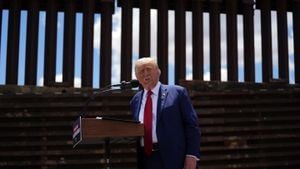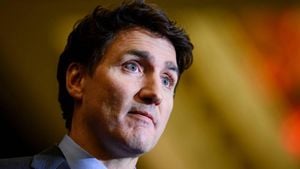Thousands of demonstrators took to the streets outside the Georgian parliament on November 25, 2024, as the newly elected legislature held its first session. The atmosphere was charged, marked by the absence of opposition lawmakers and the country’s ceremonial president, who boycotted the session amid claims of electoral fraud and heavy Russian influence over the ruling party, Georgian Dream.
Many protesters accused the Georgian Dream party of rigging the October elections. Official results indicated the party had secured almost 54% of the votes cast, assuring its continued dominance. Yet, opposition leaders contend this percentage is suspicious, pointing to numerous violations reported during the election process.
"This is not merely about politics; it’s about the future of our country," said Nika Melia, leader of the Coalition for Changes. Melia emphasized the struggle between people yearning for freedom and those trying to uphold what he described as increasingly oppressive rule. “We will do everything to defeat this so-called government,” he vowed passionately.
European observers shadowed the election and reported instances of bribery, double voting, and even violence—elements creating what they deemed a divisive environment for the election. The U.S. and other western nations have demanded thorough investigations of these alleged electoral malpractices.
President Salome Zourabichvili has been vocally opposed to the new parliamentary session, insisting it is unconstitutional under the weight of the electoral fraud allegations. She even lodged a lawsuit at the Constitutional Court, arguing violations of the principles enshrined within the nation’s constitution. On social media, she criticized the legitimacy of proceedings and echoed the sentiments of many who demand transparency and accountability.
Turning heads both domestically and internationally, the developments have ignited fears about Georgia's political direction. Critics accuse Georgian Dream of gradually leaning more toward Russian policies, primarily through its recently passed legislation sanctioning increased governmental control over civil society and the media.
Two weeks prior, the EU had already suspended Georgia’s EU membership process indefinitely after the introduction of laws targeting NGOs and organizations receiving foreign funds. Observers likened these measures to similar laws utilized by Moscow to discredit dissenters. The atmosphere outside the parliament reflected these concerns, with thousands of protesters demonstrating their anger, carrying signs and chanting slogans against both the government and their perceived Russian affiliations.
The tone of the political climate raised questions about Georgia’s aspirations to align more closely with the West, especially concerning the European Union. Many citizens who participated in the protests expressed disappointment, feeling their votes had been undermined and the democratic process compromised.
Protesters with Georgian flags faced rain and riot police stationed outside the parliament. Their calls for new elections reverberated through the wet streets, signaling widespread discontent with the ruling party's actions. "This is our country, and we deserve the right to choose our leaders fairly!" shouted one protester.
Despite the session continuing with only the Georgian Dream party members present, the opposition boycott speaks volumes about the fractures within Georgian politics. The parliament convened with only 88 members actively participating, well below the 150-seat total. The boycott served as both protest and political strategy, demonstrating solidarity among the opposition parties and their shared grievances against the government.
Looking back at the elections, many citizens had expressed optimism about reforms and the potential for change. Yet, the rising disillusionment following the October vote has transformed this hope to frustration, fear, and anger on the streets of Tbilisi.
The protests mark only the latest chapter in Georgia's political saga, with resistance against perceived authoritarianism becoming more pronounced. The sight of thousands rallying against the government under rapid rainfall portrayed not just dissent but also unwavering determination among citizens refusing to remain silent.
Emotions were palpable throughout the day, as chants echoed through the rain-soaked streets of Tbilisi, each voice contributing to the collective call for democracy and accountability. The session within parliament may have commenced, but the real battle raged outside—one for the soul of Georgia.
The ruling party, holding the reins of power, may proceed unquestioned for now, but the voices outside remind them of the populace longing for transparency, respect, and above all, true democracy. Is this the start of something greater? Only time will tell.



